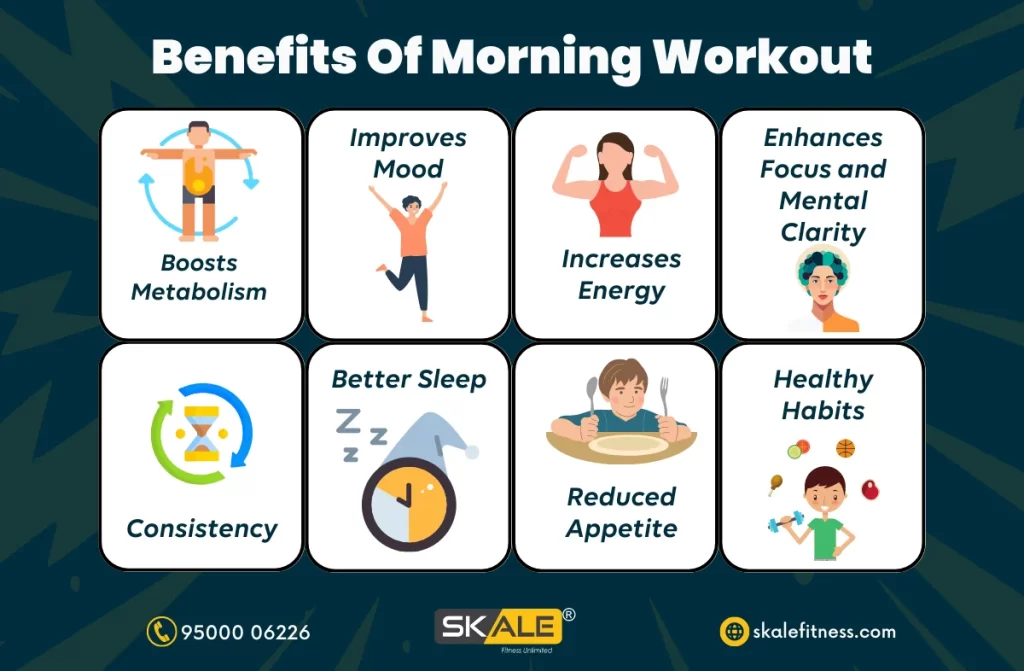Starting your day with exercise can have a profound impact on your overall well-being and productivity. The benefits of exercising in the morning have been shown to improve mood, increase energy levels, and boost mental clarity, all of which can set a positive tone for the rest of the day. In this blog, we’ll explore the science behind why exercise is such a powerful tool for setting a positive tone and increasing productivity, as well as provide tips for incorporating exercise into your morning routine.
Positive Effects of Exercise on Mood and Energy Levels
Exercise has a powerful impact on both the body and the brain. When you exercise, your body releases endorphins, which are hormones that trigger positive feelings and reduce pain. At the same time, the benefits of exercising in the morning helps regulate the levels of cortisol, a hormone that is associated with stress. By regulating these hormones, exercise can help improve mood, increase energy levels, and reduce stress. All of these are critical components of overall well-being and productivity.
Exercise also impacts the brain in positive ways. Regular exercise has been shown to increase the size of the hippocampus, the part of the brain responsible for memory and learning, besides improving cognitive function. Additionally, exercise has been shown to increase the production of nerve growth factors, which support the growth and survival of brain cells.

Benefits of Exercising in the Morning
- Boosts Metabolism
One of the most significant benefits of working out in the morning is the boost it gives to your metabolism. Morning exercise activates your body’s calorie-burning processes, helping you burn more calories throughout the day, even when you’re resting. - Improves Mental Focus and Clarity
Morning workouts help release endorphins, reducing stress and boosting your mood. They can sharpen your mental focus, allowing you to tackle your day with enhanced concentration. - Encourages Consistency
Exercising in the morning sets a routine, making it easier to stick with your fitness goals. Without the distractions and obligations that accumulate throughout the day, it’s easier to make time for a morning workout. - Promotes Healthier Choices
Starting your day with exercise makes you more likely to choose healthier meals and habits throughout the day. The awareness of your efforts in the morning can motivate you to eat better and avoid unhealthy snacks. - Avoids Daily Distractions
By working out in the morning, you reduce the risk of unexpected meetings, fatigue, or distractions that often interfere with evening workouts. With fewer obstacles, you can maintain a regular fitness routine.
Should You Eat Before a Morning Workout
Whether you should eat before a morning workout depends on your body’s needs and the intensity of your exercise. Some people prefer to exercise on an empty stomach, while others find that eating a small, protein-rich snack helps fuel their workout.
- Exercising on an empty stomach (fasted cardio): This can help your body burn more fat, but it’s not ideal for everyone, especially for intense workouts.
- Eating a light snack: A banana, a small serving of oatmeal, or a protein shake can provide the necessary energy without making you feel sluggish.
Different Types of Exercises for Starting Your Day
There are various types of exercises that are ideal for a morning workout, each offering unique benefits for your body and mind. There are certain benefits of exercising in the morning that includes the following:
Cardiovascular exercises are popular choices for morning routines. Activities like running, cycling, or performing jumping jacks can elevate your heart rate, increase blood flow, and pump oxygen to your muscles and brain. This helps wake up your body and mind, promoting alertness and focus for the day ahead. Moreover, it stimulates the release of endorphins, which are natural mood-enhancing chemicals, leaving you feeling more positive and ready to tackle the challenges of the day.
Strength training exercises are also great for a morning workout. Bodyweight exercises like push-ups, squats, and lunges not only help build and tone muscles but also improve overall fitness and flexibility. Strength training can increase your metabolism, leading to more efficient calorie burning throughout the day.
Mindful exercises, such as yoga and meditation, offer a different approach to morning workouts. These practices focus on centering your mind, calming your thoughts, and finding a sense of peace within yourself. Yoga combines movement with breath, stretching, and strengthening the body while promoting relaxation and reducing stress.
Morning workouts vs. evening workouts
Morning and evening workouts both have their advantages, and the best time to exercise can vary based on personal preferences, schedule, and body rhythms. Here’s a breakdown of the benefits associated with each:
Morning Workouts:
- Increased Energy and Focus: Starting the day with exercise can boost energy levels, mental focus, and productivity throughout the day.
- Consistency: Morning workouts may be easier to stick to consistently since they’re done before daily responsibilities and potential distractions arise.
- Metabolism Boost: Morning exercise can jumpstart your metabolism, potentially aiding in weight management.
- Improved Mood: Physical activity in the morning releases endorphins, promoting a positive mood for the day ahead.
Evening Workouts:
- Increased Muscle Strength: Studies suggest muscle strength and flexibility peak in the evening, potentially reducing the risk of injury during workouts.
- Higher Body Temperature: Body temperature tends to be higher in the evening, potentially allowing for better performance and reduced risk of injury.
- Stress Relief: Evening workouts can help relieve stress accumulated throughout the day, promoting relaxation and better sleep.
- Social and Gym Availability: Gyms tend to be less crowded in the evening, offering more equipment availability, and it might align better with social workout routines.
Tips to Get Started with Morning Exercise
Starting a morning workout routine may seem challenging, especially if you’re not a morning person. Here are some tips to make it easier:
- Prepare the Night Before
Lay out your workout clothes and shoes so that you’re ready to go as soon as you wake up. - Set a Consistent Wake-Up Time
Try to wake up at the same time every day. This will help regulate your body clock, making it easier to wake up for your workout. - Start Small
Begin with short, manageable workouts like 15–20 minutes of yoga or brisk walking. Gradually increase the intensity and duration as you become more comfortable. - Reward Yourself
Motivate yourself by rewarding your morning efforts. Whether it’s a delicious breakfast or a relaxing post-workout shower, having something to look forward to can keep you motivated.
Takeaway
The benefits of exercising in the morning go beyond just physical fitness. Morning workouts help you avoid distractions, make healthier choices throughout the day, and keep your metabolism active. Whether you decide to work out fasted or after a light snack, the key is to find what works best for your body and schedule.
Conclusion
To conclude, starting your day with exercise can set a positive tone for the rest of the day and increase overall productivity. The benefits of working out in the morning have a powerful impact on both the body and the brain, regulating hormones such as endorphins and cortisol, increasing focus and mental clarity, and reducing stress levels. Incorporating exercise into your morning routine can be challenging, but there are many tips and different types of exercises to help you get started. Give it a try and see the positive impact it can have on your well-being and productivity.
Also Read: Do You Need a Personal Trainer in a Gym?




